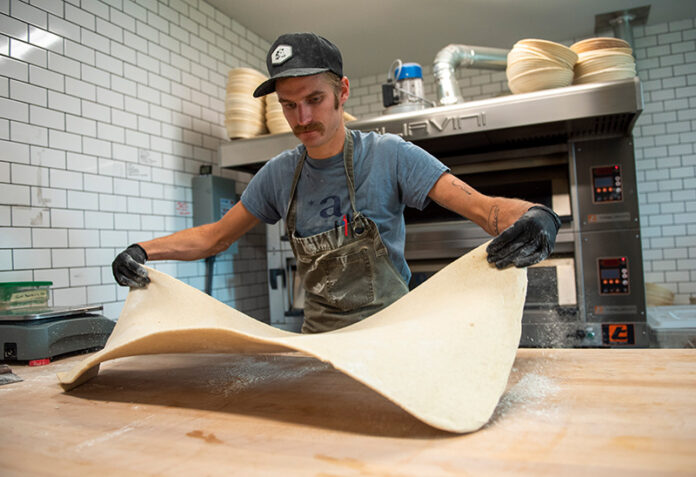Despite an unanticipated late opening on July 22, the not-so-new new bakery at the Grey Barn and Farm in Chilmark produced more than 2,000 loaves of artisanal bread by September 1 and had gone through 3,500 pounds of flour in the month and a half it had been open.
“It was very, very busy, ” 32-year-old baker Christian Walter said. “I was working every day this summer. I’m definitely glad it’s September, as I think all Islanders are.”
Lines formed at times this summer, especially around 10 a.m. on Fridays, Saturdays and Sundays when Walter walked warm, flaky croissants from the bakery across the courtyard lawn to the farmstand. Those sold out quickly. As a neighbor myself, within walking distance from the farm, I knew I had to get there exactly at 10, and not 10:30 as I did one day, only to miss the croissants completely.
Walter said he even had a group of people knocking on his bakery window one day this summer at 5 a.m. They had been biking on the road and drawn in because “it smelled so good.”
Farm owner Eric Glasgow says the bakery is a “great addition” to their market store, which has gradually expanded over the 10 years since opening and carries organic milk, cheese, meat, farm vegetables, herbs, salad greens, and an assortment of local pottery and art. The bakery rotated up to 15 different types of breads, including his signature sourdoughs. On occasion, there were also English muffins, brioche rolls, and challah. With fall arriving, Walter says he will have time to experiment and expand offerings to include heartier breads suited for colder weather.
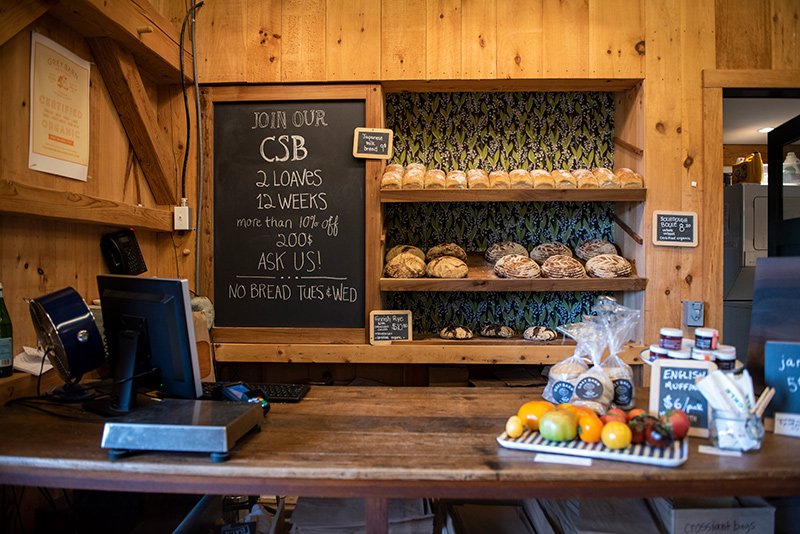
This fall, the farm bakery started offering a CSB — a Community Supported Bread program. Like a CSA for farm produce, participants pay up front for bread for 12 weeks and will pick up 2 freshly baked loaves each Monday from September 20 through December 16. Croissants will continue this fall (Friday, Saturday, and Sunday at 10 am).
Walter gets especially excited about the naturally fermented sourdough: bread with a crispy outer crust and a tasty, creamy center crumb from freshly milled flour with the flavors and nutrients intact. He follows a “stretch and fold” technique pioneered by a couple of prominent bakeries in the U.S., including the famed Tartine Bakery in San Francisco. Giving the bread a series of foldovers over a longer course of rising (18-24 hours) creates a large, open crumb structure and allows maximum hydration. “When you do finally bake,” says Walter, “you end up with a much more moist interior without having to use commercial dough softeners or enriching your dough.”
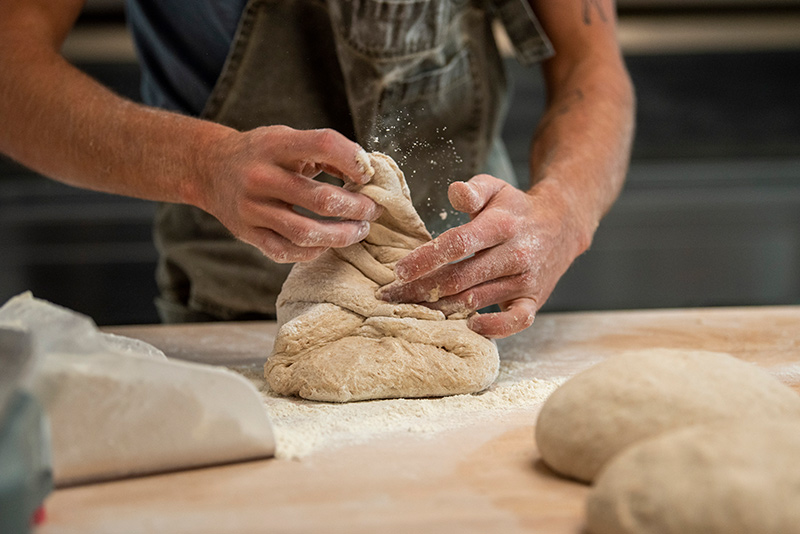
Everything at the farm is certified organic, Walter says. “All the eggs, milk, vegetables, cheese, and herbs used in the breads are all from the farm.”
Walters says he views this type of baking as more of a return to the way bread was baked around the world until just 50 or 60 years ago when it changed with the advent of mass production and processed food. “Bread has always been artisan,” he points out.
We’ve gone through efforts to find better local food, Walter explains, and now people have been asking, why not bread. “We’re seeing the outcome of that. People are more interested in eating well-produced, locally produced baked goods that are made with whole ingredients that are delicious.”
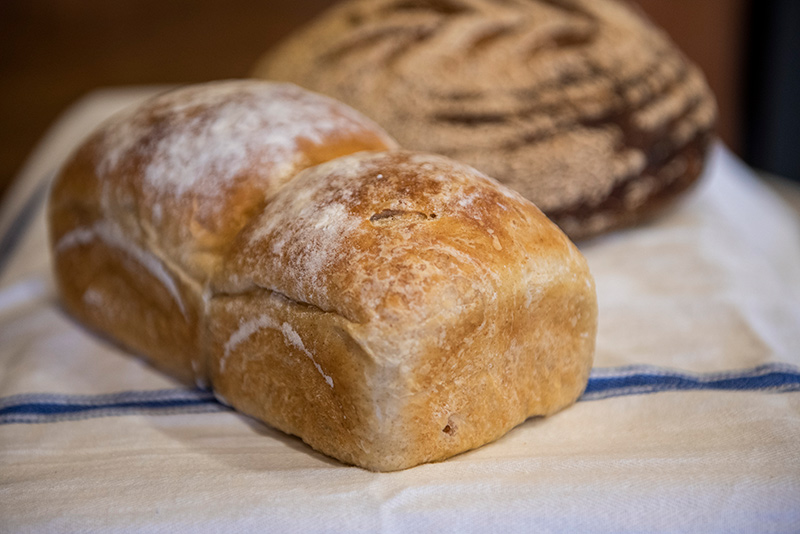
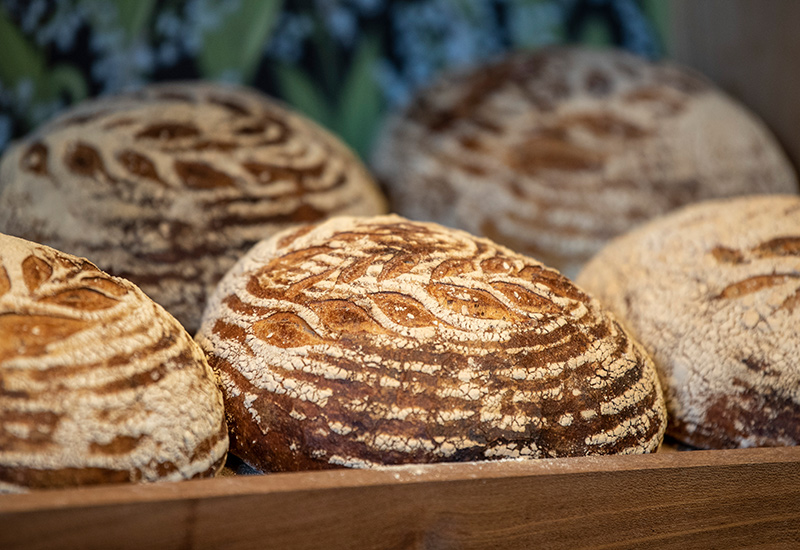
Interest in baking is on the rise, too, he says. “You see a lot of young people gravitating toward it. You see a lot of people who care and who are willing to support it.”
Walter’s own story started with farming, not baking, right out of high school at Morning Glory Farm. He eventually teamed up with his sister, Lily Walter, who started Slip Away Farm on Chappaquiddick. He was looking for a way to make farming sustainable year-round, and cycled through a variety of winter jobs, including carpentry, which he didn’t particularly enjoy.
When Slip Away built an outdoor pizza oven, they started making 80 to 100 pizza pies on a weekly pizza night open to the public. Walter also began experimenting, baking galettes, tarts, and some quiches in the outdoor oven. “I was trying to bake bread in it, but what I learned later is that a pizza oven is not a good bread oven.” His direction was crystallizing, and he wanted to learn more.
Walter applied to work at a restaurant called Rhubarb in Asheville, N.C., a geographical area that appealed to him, starting in pastry. He planned on staying only a few months. But after five months, the bread baker left and Walter stepped up. After a year, “they promoted me and I took over the bread side — making sourdough bread mainly, including levains and ciabattas. He ended up staying for three years, the last two as head baker, overseeing the addition of a sister bakery, called Rhu. Walter grew right along with the restaurant and bakery, baking hundreds of loaves each week with 16 to 18 staffers.
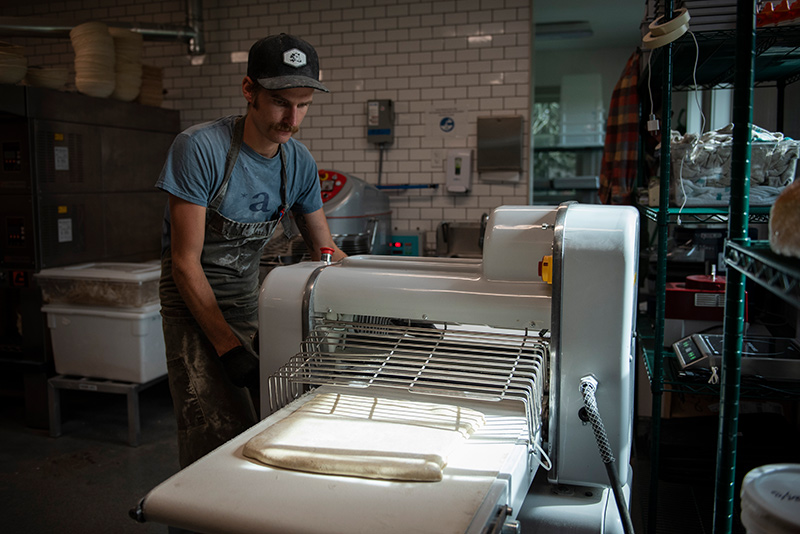
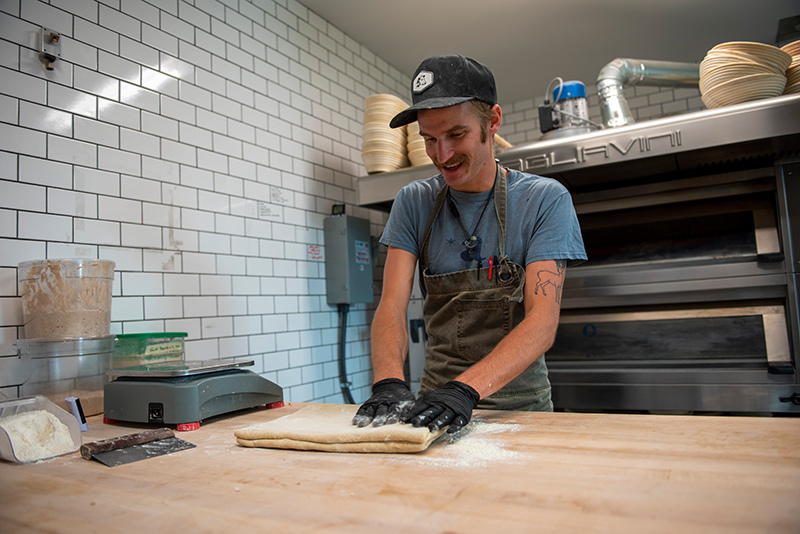
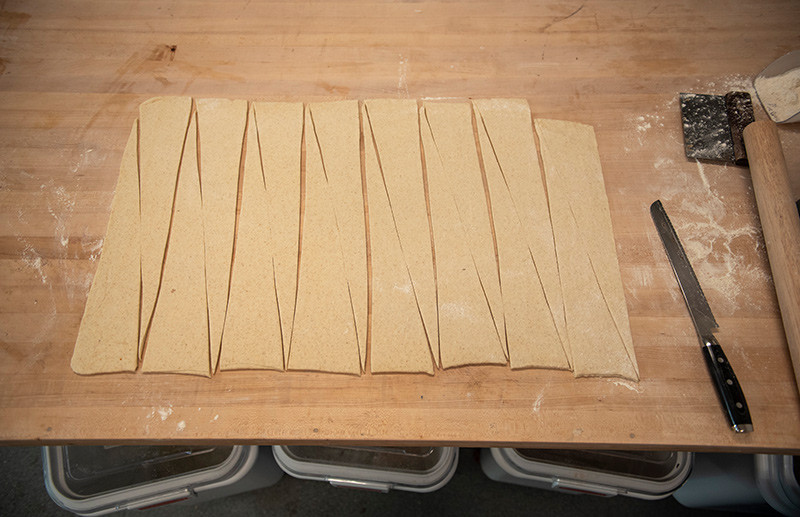
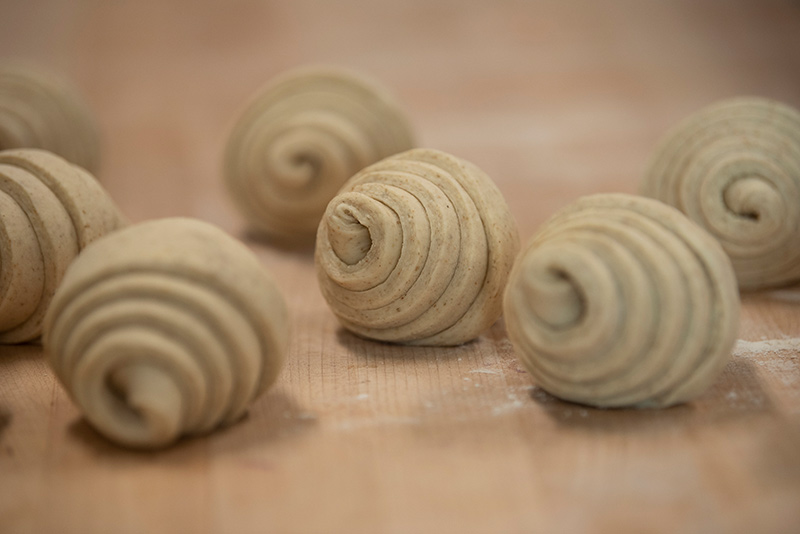
“My plan was always to come back home,” says Walter, the son of Jan Pogue, former publisher of Vineyard Stories, and the late John Walter, former editor and publisher of the Vineyard Gazette and one of the founding editors of USA Today. “I’d envisioned coming back and baking somewhere in the wintertime and farming in the summertime. I had good relationships at Rhubarb, and I liked the area, but it never felt like home.”
Back on the Island, he started searching for kitchen space for a bakery, including locations in the Airport district area. A close friend, Ethan Buchanan-Valenti, asked the Grey Barn owners, Molly and Eric Glasgow, where he was working, if they had any interest in starting a bakery. They did, and after being introduced to Walter, started talking with him in the spring of 2018.
Before building their own bakery from scratch, Walter took a road trip with Molly and Eric and visited a number of New England bakeries. Some of their favorites included Clear Flour Bakery in Brookline and Seven Stars in Providence.
They located their own bakery in the main barn at the farm, former home to the Campbell & Douglas equestrian shop some 10 years ago, before the Glasgows got the cheese and dairy up and running. The new bakery, alongside a new commercial farm kitchen, features a Tagliavini oven from an Italian company in Parma, Italy — now well worn in after a summer of use. There’s also two commercial dough mixers, and a large work table with plenty of underneath storage.
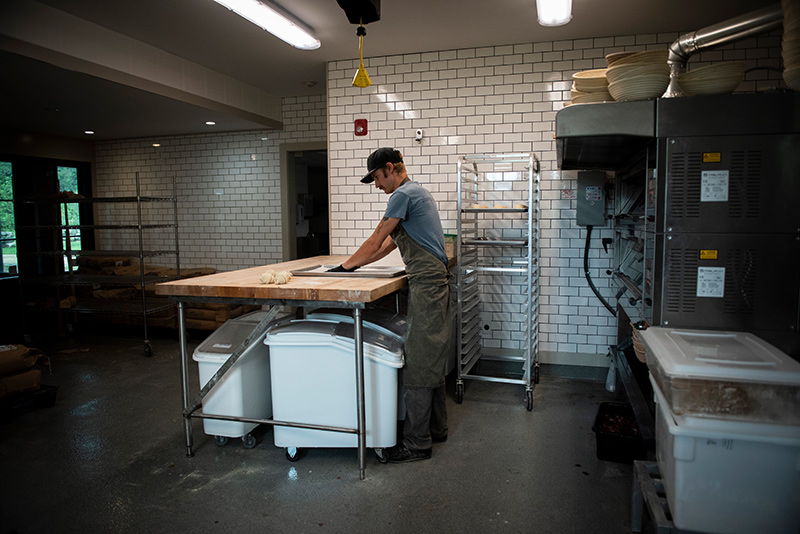
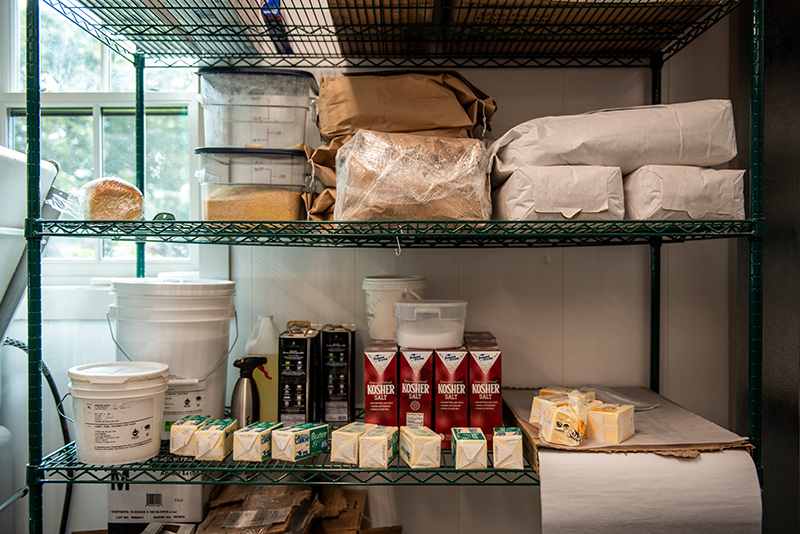
Having enough storage space, Walter explains, was one of his priorities. The bakery needs to source organic ingredients to be on hand when needed. Two prime sources for grains include King Arthur Flour from Vermont and Maine Grains, both organic and milled to order for Walter’s needs.
Small touches in the bakery, like a temperature gauge that dispenses water at exactly the temperature needed, come with the benefits of building a new bakery. A piece of equipment called a sheeter for croissants, like a giant pasta roller, allows croissants to be folded and refolded without changing the temperature of the buttery dough, creating a better product.
On my most recent visit to the bakery, no one answered my knock, so I ventured around the corner and found Walter with earbuds in, wiping a few tears from his eyes. As I went to get a hairnet, I wondered if he had just received some bad news and it wasn’t a good time for an interview, or whether the summer had simply worn him down.
When I returned, I saw the actual reason: three extra-large sheet pans of onions he had just sliced, about to go into the oven for the rye bread with caramelized onions. As the onions baked, he carefully weighed the other ingredients into the sourdough base, including maple syrup, which balances the slight bitterness of the rye flour, and a cooked porridge of cracked rye berries. “It’s probably the most labor-intensive bread I do. It’s also one of my favorite breads,” he says.
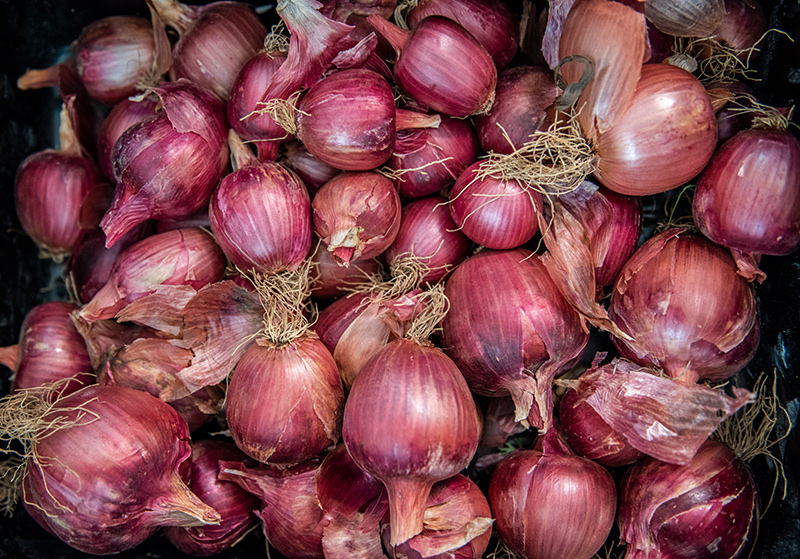
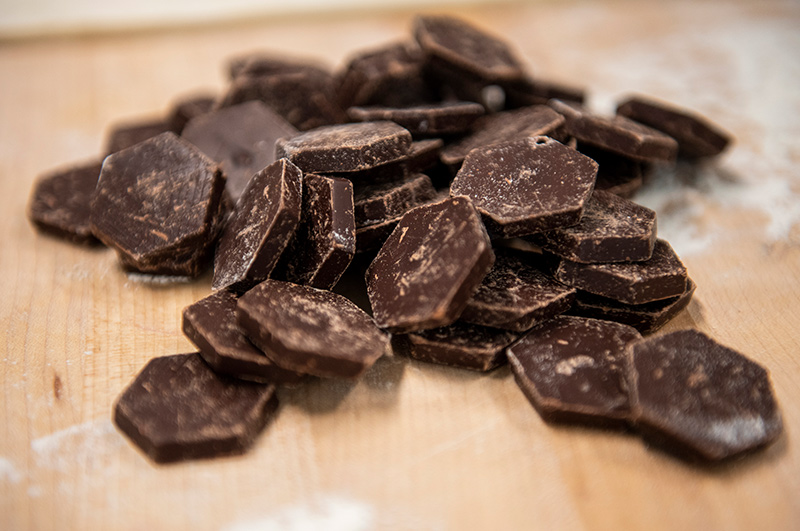
As he was preparing the dough, Walter was contemplating two new breads he wanted to try, now that he had a breather after the intense summer opening. He was either going to bake a brioche with the farm’s RipRap cheese or a rye brioche with their Bluebird blue cheese. I noticed the next day, as I passed the blackboard on South Road where the farm is located, it read: Bluebird Brioche.
The rye mix he was working on was hand-kneaded and then stored in the walk-in refrigerator for its overnight fermentation. It would appear in the baking rotation for the next morning, which started at 4 am.
He would then bake, and begin the process all over again.
Along with the new bakery at Grey Barn and Farm, Olivia Pattison of Cinnamon Starship and Kate Warner of the Vineyard Bread Project also bake artisan breads people swear by and seek out each week.
The Vineyard Bread Project
You can only get Kate Warner’s bread once a week or once every other week, and only by joining the Vineyard Bread Project or pre-ordering on-line. Each Friday, Warner bakes three types of breads from a rotating list of 20 artisan-style breads, and people come to her West Tisbury home to pick them up fresh from the oven. She started the community-supported bread program out of her kitchen in 2008, and like community supported farm shares (CSA’s), people sign up to receive two or more loaves every other week year-round.
“I think it has created a community and I like that,” explains Warner about one of the reasons she started the Vineyard Bread Project. People picking up bread chat with Kate and often hang out to exchange local news with some of the 40 plus families or individuals who are regulars. “That’s one of the main things that’s different about this. It’s low on volume, but high on community feeling.” Warner also offers occasional bread baking classes to share her knowledge.
An architect by trade who once worked at Humphrey’s Bakery, Kate took her lifelong interest in bread and her civic-mindedness to create this pretty unique bread program on the side. She upped her quest to make “really good artisan-style bread in a home kitchen” by traveling to study and bake. She went to Bath, England, to study with Richard Bertinet; took a series of classes at the King Arthur baking company in Vermont; and headed to the San Francisco Baking Institute as well. On the Vineyard, Warner also founded the Vineyard Energy Project to promote renewable energy solutions, and initiated the Living Local Harvest Fest.
“It’s been a learning experience for me that I share with members, rather than a production bakery offering the same breads all the time,” she says about the 40 to 50 loaves she bakes weekly. “ I am always working to perfect the bread I offer to my customers and looking for new breads and methods to try.” She’s added naturally leavened bread to the mix. Her multi-grain breads, among the most popular, now include a wholly delicious local whole wheat and a Jewish rye which includes grains from island grower Dan Sternbach and Maine Grains.
She also likes to include a wide variety for differing interests, all featuring quality ingredients and organic as much as possible. There are regular baguettes, ciabattas and one called fougasse, a chewy, crunchy bread topped with extra virgin olive oil, parmigiano-reggiano, salt and pepper. Probably the number one favorite, she says, is the warm cinnamon-raisin, which members say is a real treat.
Find out more about Kate Warner’s breads and how to order them by heading to her website, vineyardbreadproject.com.
Cinnamon Starship
At Saturday’s farmers’ market in West Tisbury, people beeline toward Olivia Pattison’s booth, picking up a loaf of bread, a sandwich or that week’s featured pastry such as a mini fruit galette or blueberry cake. Despite baking through the night, often until 3 a.m., the goods Olivia brings, often around 120 loaves of her naturally leavened breads plus other items, typically sell out before the market ends at noontime.
Her Island rye bread, a traditional deli style, uses grains grown by local farmer Dan Sternbach. An einkorn bread, made from this ancient grain of the same name with an “amazingly nutty flavor” and lower on the glycemic index, is 100 percent Island grown. Her very popular raisin flax and oatmeal buckwheat feature grains from Maine Grains, a gristmill specializing in locally sourced organic and heritage grains located in the town of Skowhegan, Maine.
Calling her bakery Cinnamon Starship, after a nickname a friend gave her because he thought she filled the world with “cinnamony goodness,” Pattison explains that naturally leavened sourdoughs not only taste better but give your body more access to the nutrients and are easier to digest because the natural yeast and enzymes have already started breaking down the gluten. She’s proud of her efforts to source whole grains from both the Island and New England.
“That’s my point of pride; really being a part of the local ecosystem,” says the 33-year-old baker who lives in West Tisbury. Her sandwiches and pastries also feature local produce.
Pattison has been on the Island full-time nearly 15 years, working for two years as pastry chef at the Beach Plum Inn restaurant and the last five years baking out of the Scottish Bakehouse in Tisbury, which also sells her breads. Pattison spent some of that time off-island, polishing her bread-baking techniques. She interned at Tartine Bakery in San Francisco and spent time at both the Berkshire Mountain Bakery and Il Buco Alimentari market restaurant in New York City.
Find Cinnamon Starship bread at the Wednesday and Saturday farmers’ market in West Tisbury, and also at the Scottish Bakehouse.
West Tisbury resident Catherine Walthers is a private chef and cookbook author; find her on Instagram at Catherine_Walthers.
















